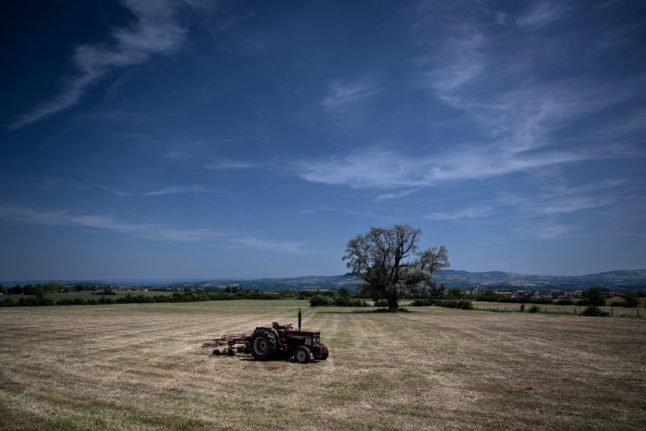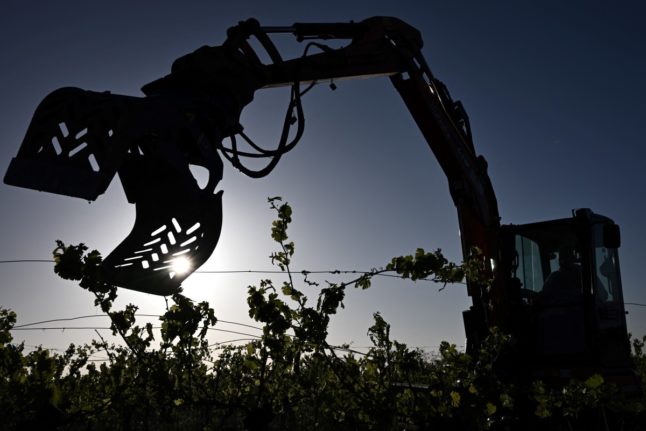As food prices rise in France and elsewhere, questions over the country’s food security and self-sufficiency have been asked.
Russia’s invasion of Ukraine – a major exporter of wheat, corn and oil – has affected global markets, with prices for such products increasing dramatically, while sanctions imposed on Russia – the world’s biggest wheat exporter – following the invasion are also hitting prices.
It has also prompted questions as to whether, if necessary, France could feed the 67 million people who call it home, while both the European Commission and the G7 set out plans to safeguard global food security.
Unlike other countries, such as Switzerland, France does not have a formal policy of self sufficiency for food – though it does have a policy for energy security.
READ ALSO Why is France so obsessed with nuclear power?
“There is no risk of shortage in France because our agriculture and our agri-food sectors are strong and sovereign,” former agriculture minister Julien Denormandie said on March 16th, while acknowledging that the industry faced a number of challenges.
He pointed to the economic and social resilience plan published by ex-Prime Minister Jean Castex to protect the French economy from the the effects of the Ukraine war, and which included measures to, “secure our producers, our processors as well as our agricultural and food production from 2022.”
Food prices, as predicted, have risen, both for imports and for domestically produced goods as farmers are hit by rising costs for fuel. The agriculture industry has been among the sectors consulted and farmers have been singled out for support, in order that they will be able to minimise price rises to consumers.
In April 2020, at the height of the Covid pandemic, it was estimated that France imports about 20 percent of its food.
But France – a food exporter – could feed its entire population, according to a report by the think tank Utopies, published in April. There’s a reason the country has been referred to as the ‘bread basket of Europe’.
The study found that France currently meets 60 percent of its own food needs, but has the potential to become self-sufficient. The report said that the 26 percent of food products currently grown in France for export or incorporation into processed food could be used to cover 98 percent of France’s domestic needs, the report said.
Food processing in France, of which some 24 percent is currently exported, could cover 114 percent of the country’s needs in that sector, it added.
Of course food ‘needs’ don’t include luxury imported items like exotic fruits, chocolate and coffee, so diets would see a change in a completely self-sufficient France.
More recently, drought has also prompted short-term concerns, with French farmers worried about their harvests this year.
France is the EU’s biggest wheat exporter, and one of the top five in the world. But hopes that French farmers would be able to offset at least some of the shortfall in the world’s supply of grain following Russia’s invasion of Ukraine have been hit by the record low rainfall so far this year, which have prompted warnings of a large drop in yields.
ALSO READ ‘No region has been spared’: Why the dry weather in France is causing concern
The forecast is for a smaller than usual French wheat harvest this year. With wheat-producing states in the US such as Kansas and Oklahoma also suffering in drought conditions, a poor harvest in France this year could be particularly significant – and could lead to wheat prices rising even higher in the short term.
At the height of the pandemic, president of the Fédération nationale des syndicats d’exploitants agricoles (FNSEA) Christiane Lambert told Les Echos that there were two key pillars to ensuring food security and independence in France – the ability to produce and the ability to store.
“No one bought French flour anymore because foreign flour was cheaper,” Lambert said. “So we produced less. But with the coronavirus crisis, it was necessary to respond to demand and therefore relaunch the production lines by running them day and night to avoid shortages.”
French agriculture was able to meet the challenge then. “We have in France a complete ecosystem which allows us to control all the links in the food chain … It must be preserved if we want to be sovereign over our food,” Lambert added.
But there would need to be a change in philosophy about food, according to Les Republicains’ senator Laurent Duplomb.
In France, “entry-level” agricultural products are mainly imported, since authorities have insisted on reorienting domestic production towards quality over quantity.
“We must also stop focusing on high-end agriculture because food sovereignty means being able to produce for everyone,” Duplomb said back in 2020.
“The risk in a few years is to have two French consumers. The first will have the means to buy top-of-the-range French products, the second will be condemned to consume only imported products since France will no longer produce them.”



 Please whitelist us to continue reading.
Please whitelist us to continue reading.
It would be great to see France allow the trade/exchange of fruit and veg ‘over the gate’ so small domestic growers with a bit of surplus can actually benefit their local communities as pricing is generally lower than what you see in supermarkets or at markets.